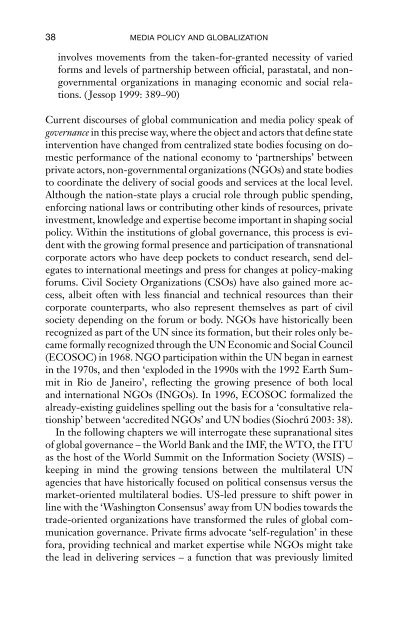Media Policy and Globalization - Blogs Unpad
Media Policy and Globalization - Blogs Unpad
Media Policy and Globalization - Blogs Unpad
Create successful ePaper yourself
Turn your PDF publications into a flip-book with our unique Google optimized e-Paper software.
38 MEDIA POLICY AND GLOBALIZATION<br />
involves movements from the taken-for-granted necessity of varied<br />
forms <strong>and</strong> levels of partnership between official, parastatal, <strong>and</strong> nongovernmental<br />
organizations in managing economic <strong>and</strong> social relations.<br />
( Jessop 1999: 389–90)<br />
Current discourses of global communication <strong>and</strong> media policy speak of<br />
governance in this precise way, where the object <strong>and</strong> actors that define state<br />
intervention have changed from centralized state bodies focusing on domestic<br />
performance of the national economy to ‘partnerships’ between<br />
private actors, non-governmental organizations (NGOs) <strong>and</strong> state bodies<br />
to coordinate the delivery of social goods <strong>and</strong> services at the local level.<br />
Although the nation-state plays a crucial role through public spending,<br />
enforcing national laws or contributing other kinds of resources, private<br />
investment, knowledge <strong>and</strong> expertise become important in shaping social<br />
policy. Within the institutions of global governance, this process is evident<br />
with the growing formal presence <strong>and</strong> participation of transnational<br />
corporate actors who have deep pockets to conduct research, send delegates<br />
to international meetings <strong>and</strong> press for changes at policy-making<br />
forums. Civil Society Organizations (CSOs) have also gained more access,<br />
albeit often with less financial <strong>and</strong> technical resources than their<br />
corporate counterparts, who also represent themselves as part of civil<br />
society depending on the forum or body. NGOs have historically been<br />
recognized as part of the UN since its formation, but their roles only became<br />
formally recognized through the UN Economic <strong>and</strong> Social Council<br />
(ECOSOC) in 1968. NGO participation within the UN began in earnest<br />
in the 1970s, <strong>and</strong> then ‘exploded in the 1990s with the 1992 Earth Summit<br />
in Rio de Janeiro’, reflecting the growing presence of both local<br />
<strong>and</strong> international NGOs (INGOs). In 1996, ECOSOC formalized the<br />
already-existing guidelines spelling out the basis for a ‘consultative relationship’<br />
between ‘accredited NGOs’ <strong>and</strong> UN bodies (Siochrú 2003: 38).<br />
In the following chapters we will interrogate these supranational sites<br />
of global governance – the World Bank <strong>and</strong> the IMF, the WTO, the ITU<br />
as the host of the World Summit on the Information Society (WSIS) –<br />
keeping in mind the growing tensions between the multilateral UN<br />
agencies that have historically focused on political consensus versus the<br />
market-oriented multilateral bodies. US-led pressure to shift power in<br />
line with the ‘Washington Consensus’ away from UN bodies towards the<br />
trade-oriented organizations have transformed the rules of global communication<br />
governance. Private firms advocate ‘self-regulation’ in these<br />
fora, providing technical <strong>and</strong> market expertise while NGOs might take<br />
the lead in delivering services – a function that was previously limited

















